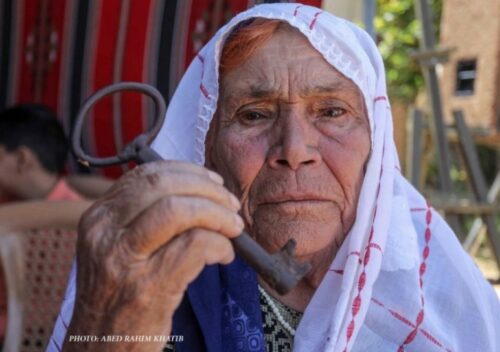By Al-Mezan Center For Human Rights – Published On May 15, 2023: On 15 May, Palestinians all over the world mourn 75 years of al-Nakba (‘catastrophe’ in Arabic). The day marks the forceful mass expulsion of around 750,000 indigenous Palestinians from their ancestral homes, lands, and properties at the hand of Zionist forces and militias to make way for the new population of Jewish settlers. During the Nakba, around 531 villages were totally destroyed, and some 15,000 Palestinians were killed by Zionist militias, who between 1947 and 1949 committed at least 70 massacres against Palestinians.[1]
By the time of the Nakba, while tens of thousands of new Jewish settlers were settling on the remnants of expropriated Palestinian lands, hundreds of thousands of indigenous Palestinians became stateless refugees scattered around the world. Today there are approximately more than 9 million Palestinian refugees (65.5 percent of Palestinians worldwide), 1.7 million of whom reside in the Gaza Strip.[2]
For the Palestinian people, the Nakba did not end in 1948, as its legacy continues to overshadow their present and future. Since the establishment of the State of Israel, Israeli authorities have been employing settler-colonial policies and practices that undermine the collective rights of the Palestinian people, particularly their inalienable right to self-determination and return, in order to maintain Jewish supremacy in all areas between the Mediterranean Sea and the Jordan River.
Israel’s settler colonial legacy is reflected today in a painful series of manifestations of colonization and apartheid, which include—among others—the confiscation and land grabbing in the occupied West Bank, expansion of illegal settlements, the de facto and de jure annexation of Palestinian territory, and illegal closure and blockade imposed on Gaza.
Today, in the occupied Gaza Strip, two million Palestinians—66% of whom are refugees denied their right of return to their homes and lands—are marking Nakba Day amid Israel’s renewed military assault on the Strip. Between 9-13 May, 33 Palestinian people were killed, including six children and four women, and 147 others were injured by Israeli attacks against the Gaza Strip. In addition, 86 residential units were entirely destroyed housing 83 families of 514 people, including 206 children and 86 women, while hundreds more residential units were also partially damaged.
The attack, which is the latest of a series of repetitive assaults against the besieged enclave, has constituted a horrifying illustration of Israel’s policy of collective punishment of the Palestinians confined and trapped in the Gaza Strip.
To mark the 75th anniversary of the Nakba, Al Mezan collected testimonies of Nakba survivors who took refuge in Gaza. For them, the historical trauma they experienced remains an unhealed wound that hurts even more due to Israel’s denial of their legitimate right to return. Every year they mark this day by reviving the image and memory of a place that for millennia was theirs.
Jaber Shaba’n, an 85-year-old Nakba survivor, was forcefully expelled from Simsim village and sought refuge in Gaza. He recalls the peaceful day in his village: “Before Nakba, we had lived a peaceful life, working in our lands and living on its production. This was until 1947 when Jewish groups emerged in our communities with the unmistakable intention to expel the villagers from their lands and expropriate them for themselves.”
“Since our exodus till the present day, we have been experiencing recurrent Nakbas in the Gaza Strip. For years, Gaza has been subjected to repetitive Israeli military assaults that compounded our suffering even more”, he added.
For Ghalia Abu-Mustafa, an 81-year-old Nakba survivor, the exodus from Beersheba has been the vintage point of her personal plight that she shares with the collective experience of Palestinian refugees wherever they are. Ever since the Nakba, she has lived in Khan Younis Refugee Camp, wishing the day would come when she can return to her home where she was expelled as a 6-year-old child. “To this day, the Israeli occupation continues to strike our homes and kill our beloved ones. In 2007 my grandson was killed by an Israeli strike while riding his motorbike” she said.
In commemorating Nakba Day, Al Mezan condemns Israel’s ongoing military offensive against the Gaza Strip and the deliberate attacks on civilians and civilian objects in furtherance of its settler-colonial and apartheid policies. Today, we clamour for the international community to take concrete action to dismantle Israel’s apartheid regime in historic Palestine, activate accountability mechanisms, and provide just redress to Palestinian refugees for their historical plight.
[1] Palestinian Central Bureau of Statistics (PCBS), “Dr. Ola Awad, reviews the conditions of the Palestinian people via statistical figures and findings, on the 72nd Annual Commemoration of the Palestinian Nakba”, 13th May 2020. Available at: https://shorturl.at/jAIO6

